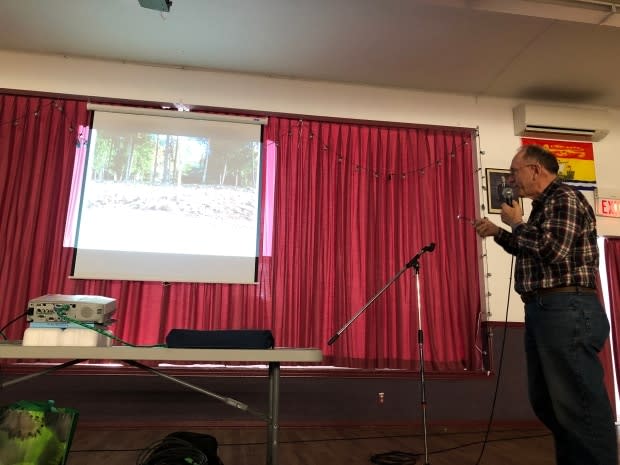After two years of flooding, Grand Lake residents brace for spring
Some people who have properties on Grand Lake in New Brunswick are already thinking about the flood season ahead.
The area was hit hard during the historic spring flooding in 2018 and 2019, damaging homes and properties.
About 30 people attended a meeting in Minto Saturday morning to hear presentations from people who have taken measures to protect their property. It was organized by the recently formed Jemseg Grand Lake Watershed Association.
"The whole purpose of this workshop is to educate people on systems — flood and erosion protection systems — that have actually worked in Grand Lake," said president Brad Nickerson.

Nickerson moved to Waterborough in 2017 and bought a house on Grand Lake.
"Just in time to catch the 2018 flood," Nickerson joked at the workshop.
He said his home wasn't damaged during the flood, but his property needed to be protected against erosion following the water damage.
Martin Topf has a cottage on Grand Lake, next to Nickerson's property, and his land also faced erosion damage from the 2018 flood.
Topf made a presentation at the workshop. He shared how he protected his land, using a layer of rock over a fabric material along the bank of his property.
"The idea being that if we get any water coming through the rocks it prevents any further erosion going down underneath," Topf said.
He said he's confident with the work he did on his land, but admits each property is unique.

"The work we have done survived last year, and if there's any damage to it, I think it will be minimal."
Jacques LeClerc attended Saturday's workshop looking to hear the different ways people have prepared their property for potential flooding.
LeClerc lives on Maquapit Lake, in Douglas Harbour, and is looking for a long-term plan to protect his property from flooding.
"Shoreline erosion is always an issue. I prefer not to have to do anything, but unfortunately that's not the way."
LeClerc said Saturday's session was helpful and gave him some options.
Chipman mill
The public got some insight on how the Irving-owned mill in Chipman fared during the last two seasons of flooding.
Tim Ward, planer mill superintendent at Grand Lake Timber, gave a presentation showing how staff blocked the floodwater around the mill.
He said they built a berm around the perimeter of the site in 2018 using sand, tarps and sandbags.

It was a quick solution the first year, but the berm worked well enough that, in 2019, staff took the same approach, but prepared in advance and made the wall higher.
The bulk of the damage at the site happened to raw material in the lumberyard.
The damage was significantly less in 2019 compared to the year before.
During Ward's presentation he said the loss of materials in 2018 equalled 11 shifts of processing at the planer mill. He said last year it was five.
Ward said the company will take the same approach again this spring and prepare earlier.


